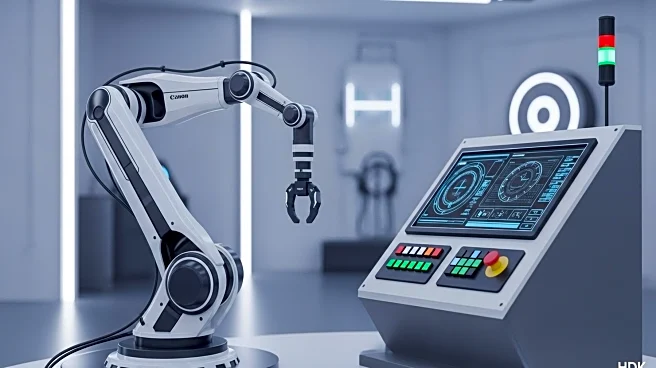What's Happening?
Güdel Inc., a subsidiary of the Swiss-based Güdel Group, has launched the CoboMover, a seventh-axis linear track designed to extend the operational range of collaborative robots (cobots) and light industrial arms. Unveiled at the FABTECH event, the CoboMover allows robots to cover up to 5 meters (16.4 feet) without manual repositioning, enabling them to manage multiple workstations efficiently. This innovation addresses significant challenges in the collaborative robot market, which constitutes about 25% of the North American robot market, by enhancing mobility within large workspaces and overcoming facility layout constraints. The CoboMover is compatible with over 60 cobots and small traditional robots, offering a maximum payload of 78 kg (172 lb.) and a repeatability of ±0.05 mm. Güdel's new product is part of its broader strategy to provide robust automation solutions across various industries, including automotive, aerospace, and logistics.
Why It's Important?
The introduction of the CoboMover is significant for industries relying on automation, as it enhances the flexibility and efficiency of robotic operations. By allowing robots to move seamlessly across larger areas, businesses can optimize their production processes, reduce downtime, and potentially lower operational costs. This development is particularly relevant for sectors like automotive and aerospace, where precision and adaptability are crucial. Güdel's innovation could lead to increased adoption of collaborative robots, further driving the growth of the automation market in North America. Companies that integrate such advanced systems may gain a competitive edge by improving their manufacturing capabilities and responding more swiftly to market demands.
What's Next?
As Güdel continues to showcase the CoboMover at industry events like FABTECH, it is likely to attract interest from automation integrators and end-users seeking to enhance their robotic systems. The company may also explore further innovations to expand the capabilities of its automation products. Stakeholders in industries such as manufacturing and logistics might consider adopting the CoboMover to improve their operational efficiency. Additionally, the broader adoption of such technologies could prompt other automation companies to develop similar solutions, potentially leading to increased competition and innovation in the collaborative robot market.
Beyond the Headlines
The CoboMover's ability to enhance the mobility and functionality of collaborative robots could have long-term implications for workforce dynamics in industries heavily reliant on automation. As robots become more capable of handling complex tasks, there may be shifts in job roles, with a greater emphasis on technical skills and robot management. This could necessitate new training programs and educational initiatives to prepare the workforce for evolving industry demands. Furthermore, the increased efficiency and precision offered by such technologies might lead to higher quality products and services, benefiting consumers and businesses alike.












